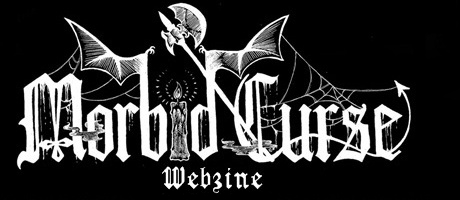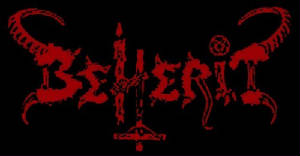
|

|

The Oath of Black Blood is
the debut album from one of the oldest and most revered Finnish black metal bands, Beherit. It is widely accepted as being
the band's first full-length record, though that is not actually the case. The band pissed away the money given to them for
the studio so Turbo Records had no other choice but to release the Demonomancy demo,
along with the Dawn of Satan's Millennium 7", as the first Beherit L.P. In some ways,
this was a good thing, as these recordings captured the raw essence of what Nuclear Holocausto Vengeance, Sodomatic Slaughter
and Demon Fornication were trying to conjure up.
The music has nothing to do with what was going on in Norway or Sweden
at the time. This is not directly influenced by Venom, Bathory or Hellhammer. The chaotic sounds on this record were inspired
by the likes of Sarcofago, Vulcano and Blasphemy. This is quite evident by the vocals, which are deeper and utilized in the
form of primal grunts and random growls. There is almost no sense of melody, whatsoever. This hellish assault is violent and
merciless, lacking catchy rhythms or memorable vocal lines. Beherit took a raw and primal approach, much like the South American
bands that influenced them the most, often seeming easily confused with early death metal, though the purely occult and Satanic
atmosphere of black metal dominates the sound. In a lot of ways, this can be seen as the European equivalent of Blasphemy,
though much more primitive and barbaric. The most structured track on here is "Witchcraft", which starts out with an eerie
doom riff and then maintains some sort of recognizable arrangement, once the speed picks up.
As one might expect
from a demo and E.P. from 1990, the production is the epitome of grim and necro. This is raw as hell and very lo-fi, to say
the least. The vocals are a little high in the mix, though that may actually add to the charm. The sound is rather muddy,
at times, with the riffs becoming difficult to distinguish from one another. In a sense, it all just serves to create a wall
of hellish noise, blending together like demonic howls and tortured screams among the raging flames of the world below.
Beherit's
first album is not for everyone. This works better as a backdrop for Satanic rituals, rather than something to truly immerse
yourself into. The Oath of Black Blood is a hideous album that sounds as if it was
vomited forth from the very mouth of Hell. If you are seeking beautiful guitar melodies, look somewhere else. Pure evil lurks
within, nothing more.
(24 Nov. 2011)

Recorded in 1992 and released by Spinefarm Records in November 1993,
Drawing Down the Moon is the first true studio album from the Finnish black metal
band known as Beherit. Nuclear Holocausto's vision was finally realized, as the end result is much more refined than what
was heard on The Oath of Black Blood, while still maintaining the evil and occult
feeling.
The music is not what one may expect from a black metal album that was released in 1993. This sounds quite
unique when compared to what was going on in Norway and Sweden. The guitar riffs, often, take on a secondary role and join
the percussion and vocals to create a wall of sound. There are moments, such as the middle of "Salomon's Gate", where a mournful
melody is utilized to drag the listener toward the infernal gates; however, in general, the guitars are heavier and more violent.
The legacy of Sarcofago and Blasphemy remains a strong part of this music, yet Beherit has taken it even further. Nuclear
Holocausto has managed to do what those bands could not and that is to still employ such a barbaric approach while also creating
a truly dark and evil atmosphere. The fast-paced, chaotic parts are still there, but now accompanied by mid-paced riffs and
even slight bits of synth, making the entire experience the equivalent of a Satanic ritual. That is really what this feels
like, and the demonic vocals add to that as much as anything else. Holocausto uses different voices, going from the deeper
growls to eerie whispers and distorted howls. Songs such as "Sadomatic Rites" and "Black Arts" feature the sort of open chords
that Varg Vikernes often exploited for Burzum, though not in the same manner. In many ways, Beherit took what was hinted at
with "Witchcraft" and expanded upon that, adding depth to the compositions. They added an element of doom to the already vicious
and chaotic music and better enables the darkness to seep into the mind of the listener. Overall, the songs are much more
structured and arranged, with each one really possessing its own identity and being easily identifiable from the rest. It
sounds as if a lot more thought was put into the songwriting and there was a goal in mind, rather than giving in to spontaneity.
The
quality of the sound is pretty clear and far better than the garage atmosphere that is found on The
Oath of Black Blood. While the guitars do not stand out very much, it seems that this is exactly how the band wanted
it, as it suits the music well. The guitar tone is very thick and kind of muddy. There is nothing icy or cold about this.
Rather than slice through your flesh with razor-sharp guitar melodies, the riffs of Drawing
Down the Moon bludgeon you into a state of near-unconsciousness. The production and the style of songwriting sounds
more similar to death metal than to the black metal of the period, upon first listen. However, no death metal band ever sounded
this evil or Satanic. The hellish vocals are at just the right place in the mix, rather than being buried or placed too high.
Thankfully, the keyboards are kept at a subtle level, never intruding too much upon the rest.
Drawing Down the Moon is highly recommended for those seeking truly evil black metal. This is neither beautiful
nor depressive. It is ugly, primitive and consumed with darkness. To get the full effect, one should listen to this with only
the light of black candles and a cold breeze coming through the window. Remove all distractions and simply offer yourself
to the malevolent spirits that this music conjures up.
(25 Nov. 2011)

Following the release of Drawing
Down the Moon, Nuclear Holocausto turned Beherit into a solo ambient project and released two albums that had very
little to do with what the band had become known for, other than in spirit. After this, he seemed to fall off of the face
of the earth for well over a decade. By late 2008, however, he was rejoined by Sodomatic Slaughter and a couple of fresh members
as Beherit entered the studio once again. In April 2009, Spinefarm Records released the product of this unholy session, Engram.
"Axiome Heroine" starts with a mid-paced riff that is accompanied by keyboards.
The atmosphere is dark and ritualistic, as the doom-laden riffs roll forward like rusted tanks that have just been reawakened.
The first part of the song serves to lull the listener into a trance-like state, receptive to the wickedness soon to follow.
Once the main riff emerges from the fog, it is clear that the beast known as Beherit has truly returned. The music possesses
more of a pure black metal feeling, with the guitar taking on a colder and thinner tone, rather than the deep sound of Drawing Down the Moon. This raw sound is more in line with The
Oath of Black Blood, in a sense. The song is rather short, as the fast guitars and blasting drums give way to the same
mid-paced riff from the beginning.
The next song is "Destroyer of Thousand Worlds", which is classic Beherit; fast-paced
riffs, barbaric drumming and demonic vocal delivery. This is reminiscent of "Dies Irae", by Bathory. This is interesting as
it is an influence not so easily heard on the band's previous outings. The band gives off an intensity not heard in many years
in this very straightforward track.
"All in Satan" is another high-speed song that passes by all-too-briefly. There
is almost no variation, whatsoever, and yet it works so well within the context of the band's style and the overall album.
There is a strange keyboard passage that reminds of the Halloween III score, slightly,
and adds an eerie feeling to the song. As with the rest of the tracks, the drumming is very crisp and dry, being less prevalent
in the mix and allowing the riffs to become the primary focus.
"Pagan Moon" starts with a very brief intro that features
a sombre acoustic guitar and the sound of a raging fire. A mid-paced riff soon comes along, driving the song forward at a
deliberate pace. The arrangement of the album is quite well thought-out, using this slower track to give a bit of a rest and
to allow the dark message to slowly seep into the the now-exhausted mind of the listener. The funeral bells are a nice touch,
adding a morbid feeling to the song. This continues as the music fades, along with the return of the flames.
Next up
is "Pimeyden Henki", which is even darker than the previous songs. It begins at a slow pace, with woeful clean vocals and
more of an emphasis on the sorrowful bass lines. This soon shifts to a faster tempo, as the tremolo riffs carve through the
listener's soul and the occult vocal delivery evokes spirits of pure evil. Holocausto's voice is more raspy and this suits
the music much better. Later in the song, the pace slows down again and a mournful choir rises from the depths of Hell. Once
more, things shift back to the faster riffs which carry the song to its conclusion.
"Suck My Blood" is one of the more
direct and unpretentious tracks, going straight for the kill. The fast tremolo riffs are quite memorable and there is a clear
structure to the song. The vocals are nightmarishly evil, especially during the calm section in the middle, where all goes
silent with the exception of the demonic voices and a subtle bit of synth. The main riff rushes forward, once more, hacking
and slicing through all in its path. This is the sort of material that would not have sounded out of place on one of the band's
earliest releases.
The closing track clocks in at over fifteen minutes, but seems like more of an extended outro than
anything else. "Demon Advance" is much slower than the rest of the songs and utilizes some odd effect on the guitar which
gives it an otherworldly feeling. After a while, the guitars fade away and leave only the synth, bass and drums, creating
a strange atmosphere. The guitars take several minutes to return, and they never do play a very prominent role. This does
not work so well as an individual song, but does better within the context of the album, as a whole.
Engram is surprisingly good and witnesses not only the rebirth of Beherit but also their return to black metal.
Having become some obscure cult act from the past, influencing many of the more recent bands in the scene, it is only fitting
that Nuclear Holocausto and his band mates have re-emerged to add to the coming darkness. This should certainly appeal to
fans of The Oath of Black Blood and Drawing Down
the Moon.
(25 Nov. 2011)
|

|

|





